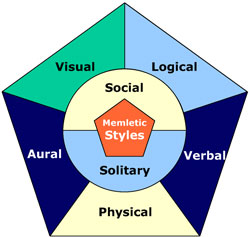Adding on to this with a widely accepted theory on learning styles.
The Learning Styles
Visual (spatial):You prefer using pictures, images, and spatial understanding. The occipital lobes at the back of the brain manage the visual sense. Both the occipital and parietal lobes manage spatial orientation.
Aural (auditory-musical): You prefer using sound and music. The temporal lobes handle aural content. The right temporal lobe is especially important for music.
Verbal (linguistic): You prefer using words, both in speech and writing. The temporal and frontal lobes, especially two specialized areas called Broca and Wernicke areas (in the left hemisphere of these two lobes).
Physical (kinesthetic): You prefer using your body, hands and sense of touch. The cerebellum and the motor cortex (at the back of the frontal lobe) handle much of our physical movement.
Logical (mathematical): You prefer using logic, reasoning and systems. The parietal lobes, especially the left side, drive our logical thinking.
Social (interpersonal): You prefer to learn in groups or with other people.
Solitary (intrapersonal): You prefer to work alone and use self-study.
Many people recognize that each person prefers different learning styles and techniques. Learning styles group common ways that people learn. Everyone has a mix of learning styles. Some people may find that they have a dominant style of learning, with far less use of the other styles. Others may find that they use different styles in different circumstances. There is no right mix. Nor are your styles fixed. You can develop ability in less dominant styles, as well as further develop styles that you already use well.
Using multiple learning styles and multiple intelligences for learning is a relatively new approach. This approach is one that educators have only recently started to recognize. Traditional schooling used (and continues to use) mainly linguistic and logical teaching methods. It also uses a limited range of learning and teaching techniques. Many schools still rely on classroom and book-based teaching, much repetition, and pressured exams for reinforcement and review. A result is that we often label those who use these learning styles and techniques as bright. Those who use less favored learning styles often find themselves in lower classes, with various not-so-complimentary labels and sometimes lower quality teaching. This can create positive and negative spirals that reinforce the belief that one is "smart" or "dumb".
By recognizing and understanding your own learning styles, you can use techniques better suited to you. This improves the speed and quality of your learning.

 Would love to see how others take notes, since I find the task super challenging.
Would love to see how others take notes, since I find the task super challenging.
